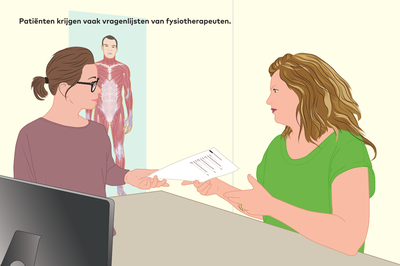The traditional paternalistic approach in health care is increasingly developing towards a patient-centered care (PCC) approach. However, not all patients are able to take advantage of the positive effects of PCC. Inadequate health literacy (HL) is an important limiting factor in the ability of patients to take on an active role and exchange information with their health care provider effectively. A provenly effective approach to improvement of provider-patient interaction and health outcomes is the use of health-related questionnaires. The aim of the research project described within this thesis was to adapt the most frequently-used questionnaire in Dutch physical therapy practice and add information and communication technology to it. A Dutch and Turkish version of the tool called Talking Touch Screen Questionnaire (TTSQ) was developed and evaluated on both usability and validity aspects. The current prototype of the tool does not yet fully solve the problems native and minority patients with low (health) literacy have with completing the adapted questionnaire. Big challenges in future development and testing the TTSQ are the recruitment of vulnerable members of the hard-to-reach native and minority target populations and finding research methods that suit the abilities and needs of these participants. This is expected to be a very challenging, labor- and time-consuming process. On the other hand, having a usable, valid and reliable TTSQ may well save a lot of time and money in both research and clinical practice in the future.
DOCUMENT

Airway care interventions may prevent accumulation of airway secretions and promote their evacuation, but evidence is scarce. Interventions include heated humidification, nebulization of mucolytics and/or bronchodilators, manual hyperinflation and use of mechanical insufflation-exsufflation (MI-E). Our aim is to identify current airway care practices for invasively ventilated patients in intensive care units (ICU) in the Netherlands. A self-administered web-based survey was sent to a single pre-appointed representative of all ICUs in the Netherlands. Response rate was 85% (72 ICUs). We found substantial heterogeneity in the intensity and combinations of airway care interventions used. Most (81%) ICUs reported using heated humidification as a routine prophylactic intervention. All (100%) responding ICUs used nebulized mucolytics and/or bronchodilators; however, only 43% ICUs reported nebulization as a routine prophylactic intervention. Most (81%) ICUs used manual hyperinflation, although only initiated with a clinical indication like difficult oxygenation. Few (22%) ICUs used MI-E for invasively ventilated patients. Use was always based on the indication of insufficient cough strength or as a continuation of home use. In the Netherlands, use of routine prophylactic airway care interventions is common despite evidence of no benefit. There is an urgent need for evidence of the benefit of these interventions to inform evidence-based guidelines.
DOCUMENT

BackgroundFluid therapy is a common intervention in critically ill patients. It is increasingly recognised that deresuscitation is an essential part of fluid therapy and delayed deresuscitation is associated with longer invasive ventilation and length of intensive care unit (ICU) stay. However, optimal timing and rate of deresuscitation remain unclear. Lung ultrasound (LUS) may be used to identify fluid overload. We hypothesise that daily LUS-guided deresuscitation is superior to deresuscitation without LUS in critically ill patients expected to undergo invasive ventilation for more than 24 h in terms of ventilator free-days and being alive at day 28.MethodsThe “effect of lung ultrasound-guided fluid deresuscitation on duration of ventilation in intensive care unit patients” (CONFIDENCE) is a national, multicentre, open-label, randomised controlled trial (RCT) in adult critically ill patients that are expected to be invasively ventilated for at least 24 h. Patients with conditions that preclude a negative fluid balance or LUS examination are excluded. CONFIDENCE will operate in 10 ICUs in the Netherlands and enrol 1000 patients. After hemodynamic stabilisation, patients assigned to the intervention will receive daily LUS with fluid balance recommendations. Subjects in the control arm are deresuscitated at the physician’s discretion without the use of LUS. The primary endpoint is the number of ventilator-free days and being alive at day 28. Secondary endpoints include the duration of invasive ventilation; 28-day mortality; 90-day mortality; ICU, in hospital and total length of stay; cumulative fluid balance on days 1–7 after randomisation and on days 1–7 after start of LUS examination; mean serum lactate on days 1–7; the incidence of reintubations, chest drain placement, atrial fibrillation, kidney injury (KDIGO stadium ≥ 2) and hypernatremia; the use of invasive hemodynamic monitoring, and chest-X-ray; and quality of life at day 28.DiscussionThe CONFIDENCE trial is the first RCT comparing the effect of LUS-guided deresuscitation to routine care in invasively ventilated ICU patients. If proven effective, LUS-guided deresuscitation could improve outcomes in some of the most vulnerable and resource-intensive patients in a manner that is non-invasive, easy to perform, and well-implementable.Trial registrationClinicalTrials.gov NCT05188092. Registered since January 12, 2022
MULTIFILE
